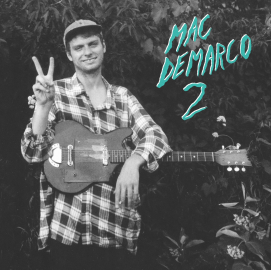Print Edition: November 7, 2012
Capitol 6
Pretty Lost
Honky tonk piano, whirring organs, wailing harmonica, doggedly-strummed acoustic guitars, tambourines with a reverberant decay that lasts forever: Vancouver’s Capitol 6 are a garage band with an identity crisis. But who ever said that was a bad thing? On their debut full-length, gruff-voiced lead singer Malcolm Jack and company occupy a space somewhere between the desperate minor-chord brooding of the Animals, rugged Americana of Bob Dylan and the Band’s Basement Tapes, and dreamy melodic instincts of recent power pop acts like New Jersey’s Big Troubles. Yet the closest contemporary touchstone is probably the stoned folk-garage of Kurt Vile with a fair share of country and the occasional psychedelic dash thrown in for good measure. Producer Felix Fung (Dead Ghosts) lends Pretty Lost a certain immersive, Phil Spector quality with intricately layered overdubs cast in a cocoon of noisy reverb. Capitol 6 are musically restless and freewheeling, ranging from steam-engine road ballads (“Wine In Bed”) to driving mid-tempo manifestos (“Beside the Fire”) and deliberately jaunty guitar-pop numbers (“Quit Your Job”), all more or less obsessed with ageing and dying. Imperfect, but sincere, Pretty Lost is a respectable debut that promises even better from Capitol 6 once they move beyond the sum of their influences.
Mac DeMarco
2
Toning down the Lou Reed-inspired androgyny and crooner-in-lipstick attitude he sported on his earlier 2012 release Rock and Roll Nightclub, Mac DeMarco’s sophomore release 2 is filled with sincere, hermetic homespun pop that follows the slacker doctrine established by Pavement’s 1994 Slanted and Enchanted. In an interview with Pitchfork in October, DeMarco mentions that his role model is singer-songwriter Jonathan Richman, mainly because Richman “seems like he’s just had a very enjoyable time his whole life.” Richman’s musical influence is apparent in the airy and detached guitar lines on the sleek “Freaking Out the Neighborhood.” “My Kind of Woman,” is a gorgeous, synthesizer-backed mess that completely intoxicates the listener with a killer combo of synth arpeggios on the hook and DeMarco’s slightly apathetic singing. The surreal and sheen “Ode to Viceroy” finds DeMarco celebrating his favourite cigarette brand. This album exhibits twangy and sun-soaked guitar rock in a style reminiscent of last years’ sedated masterpiece by Real Estate, Days. There is a dreaminess that pervades throughout, which is helped along by DeMarco’s vocals that verge on indifference, but never quite get there. It feels effortless and laid-back, but that’s part of the pleasure of DeMarco’s music.
Andy Stott
Luxury Problems
No matter how loud Andy Stott’s Luxury Problems is played, definition is found by the space within, the gaps between perceptible movement. On all of Stott’s discarded material-made productions for his second LP, there’s a sense of emergence, but always qualified with interference. As an announcing, repetitious slip of “touch” opens “Numb,” all of the core elements of Stott’s selective style appear: drone as thick as fog, a voice (Alison Skidmore’s) ripped from context and cycled, shredded, into a slowly gathering, sensual rhythm, while a beat, stopping, as elusive as words are here, pounds into out of focus. There’s a sense of the oxymoronic in Stott’s anxiety-house – dance music that’s set in a space of solitude, which finds its fullest, loneliest bursts in “Hatch the Plot.” Something approaching pure found noise becomes twisted into a dreamscape of the pull/repulsion of waiting, as the squeak of electric transport, revolutions and tracks, bookends – a train to (some) nowhere. And in the final redefinition of “Leaving,” a perfect volume build of beauty, as always here one never sure to be heard fully, even restated and underscored, becomes an expression of “[something is found],” or as Stott would have it, rearranged into “is something found?”
Hey Rosetta!
Seeds
There are two versions of “Young Glass,” one live and one recorded, and I recommend skipping the recorded one in favour of the live. In fact, I’m going to recommend skipping the rest of the album in favour of the live “Young Glass,” because after that first track, it becomes a little redundant and kind of boring. This album’s strongest feature is the marriage between strings and rhythmic guitar. Cello? Yes please. Violin? Please and thank you. We get some intense vocal emotion—that Mumford & Sons sound that everyone is in love with these days—but intensity is a little like cumin. A little is a nice surprise, but if you put a lot in, you’re going to make people gag. I’m sure they put on a spectacular live show, because they have the energy and rhythm that would make any audience shout and jump. But a recorded album is very different from a live show, and as a recorded album it’s a little lacklustre. There are worse things to listen to; I’m a sucker for soft piano (ie, “Yer Fall”) and I suspect this would make a fantastic break-up album. But then again, doesn’t everything?





